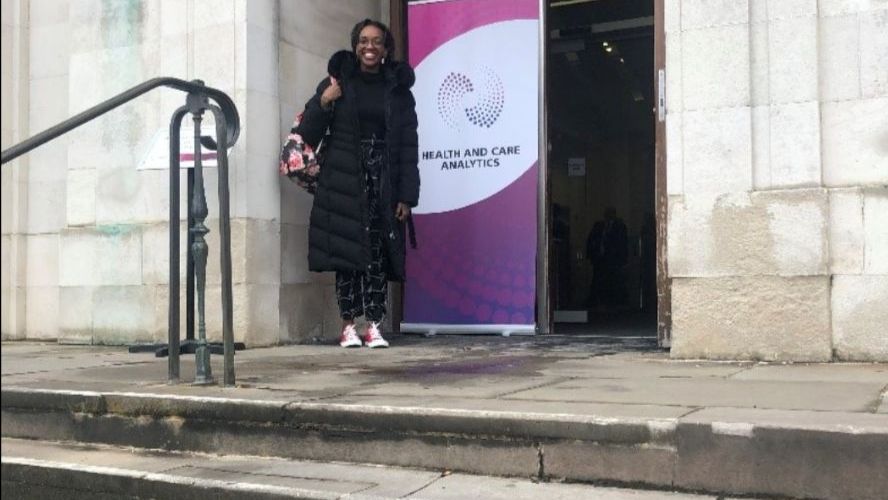Lucy Kaluvu’s experience of the Health and Care Analytics conference 2023

ARC NWC Fellow and 3rd year PhD student, Lucy Kaluvu, is undertaking a epidemiological study in St.Helens examining multimorbidity clustering and socioeconomic deprivation and its effect on the utilisation of health and social care services and treatment burden.
On 11th July 2023, I attended the Health and Care Analytics conference 2023 held at the Birmingham Medical School at the University of Birmingham. When it was first mentioned by my advisor, Professor Pritchard-Jones, I was both elated and nervous at the opportunity to have findings from my PhD epidemiological project featured at such a high-profile conference.
As the first ever conference of its kind, the Health and Care Analytics Conference 2023 was sponsored by the four NHS Commissioning Support Units, and lead by The Strategy Unit. This year’s theme “Analysts as Influencers” felt like a fitting narrative as just at the beginning of my PhD, I had limited experience in Health Analytics to now having applied Health Analytics to interrogate the Combined Intelligence for Population Health Action (CIPHA) database.
The day was filled with excitement and the hustle and bustle of meeting colleagues from different parts of the UK and from different specialties and backgrounds. The conference featured studies and projects ranging from health inequalities, social care, the use of apps and decision aiding tools, use of systems such as the John Hopkins ACG case-mix adjustment and Electronic Patient Record systems among others. It also featured prominent speakers such as Professor Ming Tang, the Chief Data and Analytics Officer at NHS England and Dr Ben Goldacre, the pioneer of the Goldacre Review that provides the guidelines to a Better, Broader and Safer Use of Health data for Research and Analytics.
I presented an overview of the findings to date of my PhD epidemiological study titled “Multimorbidity and Socioeconomic deprivation and its effect on health utilisation in Northwest England: An analysis of the Combined Intelligence for Population Health Action (CIPHA) data.”
My epidemiological research involves the examination of the chronology of diagnosis of long-term chronic conditions within multimorbidity clusters and its effect on health and social care use. I have used The Johns Hopkins ACG® System, which provides intelligence and insights to care systems to support population health management, to identify long-term chronic conditions counts for multimorbidity patients and categorize patients based on the extent of multimorbidity.
The overall conference experience was remarkable to say the least. I was able to network with leaders and peers working in Health Inequalities, Health Analytics, Multiple Long-term Chronic Conditions and Social Care. The main takeaway was from the morning speech by Dr Ben Goldacre who emphasized that all health and care research is at the center of clinical services and Informatics, and that the application Big Data within Health analytics should consider Scalability vs Turnaround in order to reduce variability. Moreover, I was elated to garner positive feedback and support from leaders in the NHS, researchers working in other consortiums on MLTCs and the team at the John Hopkins ACG system where I also received both oral and written feedback through emails and Twitter @HACA_Conf #HACA2023.
I am keen to liaise with other multimorbidity researchers working with John Hopkins ACG system across the globe. I was fortunate to meet in-person with Mr. Alan Thompson, the Director of User Support for the John Hopkins ACG system-UK and discuss my PhD project results and other multimorbidity projects currently being done in the UK and across the globe.
Alan Thompson is part of the ACG System team who supports users of the ACG System in the UK “The Johns Hopkins ACG® System is the most widely used population-based casemix system in the world. Developed and continuously maintained by a team of researchers at the Johns Hopkins Bloomberg School of Public Health, the ACG System has long been relied on for its ability to not only stratify and identify high-resource-use patients for clinical intervention, but also for the System’s unique predictive capabilities that range from prospective demand for services to prevalence of disease within subgroups.”
The ACG System has been used in the NHS for over 20 years and currently over 15 million patient records are regularly processed through the software. The insights and intelligence from the ACG System is being used for a variety of purposes. It is used by Integrated Care Systems to help develop and support health strategy, by clinical teams to identify the right people for care management programmes and Population Helath Management interventions and by organisations such as Leicester, Leicester and Rutland ICS to allocate primary care funding in a more equitable way – see case study here.
Alan continued, “The most interesting and rewarding part of my role is to hear from people who are using the ACG System to make a difference to people’s lives. This could be from nurses who are identifying people at risk of an adverse outcome or from researchers such as Lucy who are using it to generate new knowledge that will help improve the way in which health and social care services are organised. It was a delight to hear Lucy speak at the HACA conference and about the work she is doing. Her study has already attracted the interest of other members of our team and we look forward to following her work over the coming months”.
The full programme of the conference is available on https://uobevents.eventsair.com/haca-2023/programme .Accepted abstracts that have news value may be selected for a potential media release to disseminate to relevant media outlets and this will be communicated to the presenters.
The conference: https://uobevents.eventsair.com/haca-2023/
For more information on the Johns Hopkins ACG System, please visit www.HopkinsACG.org.